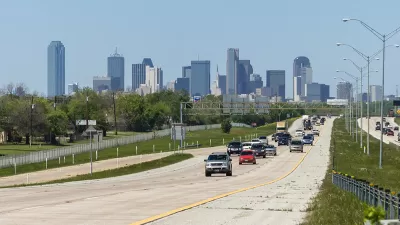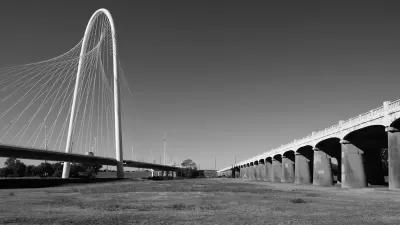Mark Lamster has eviscerated the city of Dallas for its plans to build the Trinity Toll Road before—and he'll probably do it again.
Mark Lamster, architecture critic for The Dallas Morning News, describes his befuddlement with the latest developments in the saga of the Trinity River project:
Only in Dallas would you design a highway in a park, and only in Dallas would you design a highway in a park before designing the park itself. Or even developing a general concept of that park, much less creating an authority that might actually be charged with building and paying for it.
That planning context explains, according to Lamster, why the project "has been meandering along for the better part of two decades with no tangible result beyond an endless series of conflicting reports, studies, and briefing documents."
Lamster casts doubt on the idea that the "Dream Team" that released its report for the Trinity Toll Road earlier this week cleared any of the hurdles that have plagued the project during its history. Moreover, writes Lamster, "[t]here is a good argument that the dream team should never have been convened in the first place, that it was conceived and paid for by toll-road proponents to give intellectual cover for the plan to drive a high-capacity toll road through the Trinity…"
The remainder of the column details the back-and-froth between Dream Team members and city councilmembers during the recent public hearing on the report, and also illustrates how the project exemplifies "Dallas Logic," as Lamster describes it. "Dallas Logic" resembles the "Paradox City" formulation Lamster created in 2014 in reaction to an earlier moment in the debate surrounding the Trinity Toll Road and Trinity River project.
FULL STORY: ‘Dallas Logic.’ Or, why the Trinity Project is forever stalled

Maui's Vacation Rental Debate Turns Ugly
Verbal attacks, misinformation campaigns and fistfights plague a high-stakes debate to convert thousands of vacation rentals into long-term housing.

Planetizen Federal Action Tracker
A weekly monitor of how Trump’s orders and actions are impacting planners and planning in America.

Chicago’s Ghost Rails
Just beneath the surface of the modern city lie the remnants of its expansive early 20th-century streetcar system.

Bend, Oregon Zoning Reforms Prioritize Small-Scale Housing
The city altered its zoning code to allow multi-family housing and eliminated parking mandates citywide.

Amtrak Cutting Jobs, Funding to High-Speed Rail
The agency plans to cut 10 percent of its workforce and has confirmed it will not fund new high-speed rail projects.

LA Denies Basic Services to Unhoused Residents
The city has repeatedly failed to respond to requests for trash pickup at encampment sites, and eliminated a program that provided mobile showers and toilets.
Urban Design for Planners 1: Software Tools
This six-course series explores essential urban design concepts using open source software and equips planners with the tools they need to participate fully in the urban design process.
Planning for Universal Design
Learn the tools for implementing Universal Design in planning regulations.
planning NEXT
Appalachian Highlands Housing Partners
Mpact (founded as Rail~Volution)
City of Camden Redevelopment Agency
City of Astoria
City of Portland
City of Laramie




























